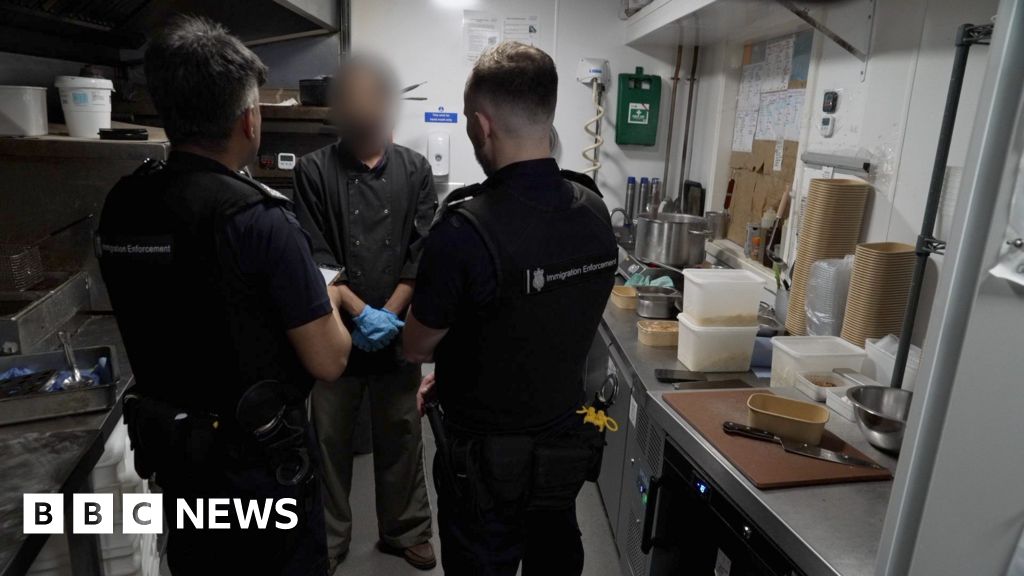Raids on London’s Culinary Scene: Exposing Illegal Workers
A Night to Remember: The Dark Kitchen Crackdown
It’s a bustling Friday night in central London, the neon lights of restaurants beckon diners, but behind this vibrant facade lies a darker reality. Hidden within a dark kitchen, a term for delivery-only establishments often tucked away in unmarked warehouses, immigration officers are gearing up to execute a major raid. Their target? Individuals working illegally in the thriving food delivery sector.
As officers breach the cramped confines of the kitchen, they discover a chef laboring alone amid the clamor of numerous incoming orders. A surveillance camera ominously captures his every move, a stark reminder of the high-pressure environment in which many undocumented workers find themselves.
The chef, albeit calm, is unmistakably anxious as he is apprehended for overstaying his visa. This moment encapsulates the reality facing countless workers striving for a livelihood against daunting odds.
The Purpose Behind the Raids
This recent operation is a pivotal part of the Home Office’s crackdown on illegal employment in London’s culinary hotspots. According to Sean Whippy, Chief Immigration Officer at Immigration Compliance and Enforcement (ICE), such kitchens are rampant with challenges because they operate in secrecy, away from public scrutiny.
"If they’re tucked away, who is monitoring that? There is nowhere for the public to report bad working conditions," Whippy explains.
A Surge in Illegal Work Arrests
Record Numbers
The statistics paint a troubling picture: since July 2024, immigration enforcement has conducted 6,784 raids, leading to 4,779 arrests—an alarming 40% increase from the previous year. Additionally, penalties levied against employers for hiring illegal workers could soar to £60,000 per individual.
According to sources, these arrests carry significant consequences, including potential director disqualifications and prison sentences of up to five years.
A Glimpse into the Lives of Illegal Workers
Harsh Realities
The man arrested in the dark kitchen was later taken to retrieve his belongings, only to be found living in overcrowded, squalid conditions. Placed on strict immigration bail, he is now required to report regularly to the Home Office, a constant reminder of the precarious nature of his situation.
Asylum seekers in the UK typically are not allowed to work while their claims are being processed. They receive minimal support—£49.18 per week in self-catered accommodation or £8.86 in catered settings, which often proves insufficient.
What Drives Asylum Seekers to Illegal Work?
The Cost of Survival
Ali, a 17-year-old who arrived from Turkey, provides insight into this issue. Forced by economic necessity, he resorted to illegal work earning less than £1 an hour in a north London barbershop.
"I was paid £50 per week for 12-hour shifts," he shared, highlighting the unsustainable economic pressures faced by young asylum seekers.
Ali’s narrative is one of fear and desperation, as he grappled with the uncertainty of potential legal repercussions.
The Ripple Effect of Enforcement Actions
A Broader Impact on the Restaurant Scene
Later that evening, immigration officers were spotted in a bustling restaurant where previous illegal work arrests had occurred. Officers conducted thorough interrogations, leading to two students being taken in for allegedly breaching their visa conditions, though ultimately released due to insufficient evidence.
A Call for Change: Advocating for Asylum Seekers
A Shifting Perspective
The Refugee Workers Cultural Association is witnessing a rising trend of asylum seekers turning to illegal work as a means of subsistence. Chairperson Ibrahim Avcil advocates for legislative reforms that would allow these individuals to work legally upon their arrival in the UK.
"Rather than people working without paying taxes, it is always beneficial for people to work and pay their taxes here in the UK," Avcil argued.
Governmental Efforts on a National Scale
A Commitment to Reform
The government has ramped up its efforts, implementing stricter Right to Work checks on those employed in gig economy roles, particularly in sectors like food delivery and construction. Dame Angela Eagle, Minister for Border Security and Asylum, emphasizes the crucial nature of these initiatives to dismantle networks that exploit vulnerable populations.
“Clamping down on illegal working in all its forms is a critical part of this government’s plan,” Eagle stated, underscoring the government’s determination to maintain the integrity of the immigration system.
Final Thoughts: A Food Scene in Transition
As London’s culinary landscape continues to evolve, the intersection between immigration enforcement and the vibrant world of food delivery presents complex challenges. With increasing scrutiny on illegal work, there arises a pressing need for comprehensive reform, enabling asylum seekers and others to contribute legally and positively to society.
The vibrant heart of London’s food culture beats on, but it does so with the undercurrents of an ongoing struggle for justice and fair treatment that can no longer be ignored.
Discover more about the ongoing challenges faced by workers and ethical practices in the hospitality industry here.





